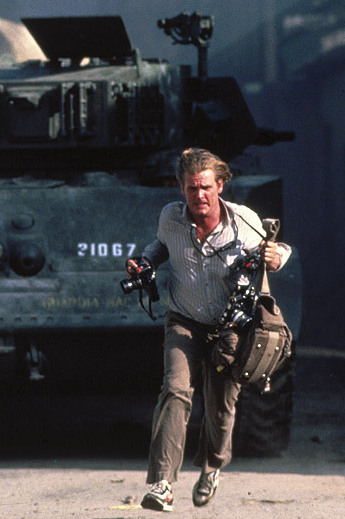Friday, October 28, 1983.
UNDER FIRE. Written by Ron Shelton and Clayton Frohman. Music by Jerry Goldsmith. Directed by Roger Spottiswoode. Running time: 127 minutes. 14 Years Limited Admission with the B.C. Classifier’s warning: Some gory violence, very coarse language and swearing.
SENIOR CORRESPONDENT ALEX GRAZIER (Gene Hackman) is going home. Years of reporting the news Under Fire has left him “tired of third-world wars.”
Me too. After years spent turning a blind eye to the events in Vietnam, moviemakers seem in a rush to touch down in every world trouble spot, and the result has been a cycle of perfectly dreadful foreign correspondent melodramas.
So far, we’ve had to suffer through a German reporter's angst in Lebanon (Circle of Deceit / Die Fälschung; 1981), an Australian broadcaster's anguish in Indonesia (The Year of Living Dangerously; 1982) and an Americanized Aussie’s anti-Communist heroics in Laos (Comeback; 1983).
I was beginning to think that Missing director Constantin Costa-Gavras was the only man left in the world capable of making a decent movie in a politically charged setting.
There is, thank the Force, another. With Under Fire, Roger Spottiswoode, the 38-year-old, Canadian-born son of British film theorist Raymond Spottiswoode, makes a major directorial breakthrough.
“You’re going to like this war," radio freelancer Claire Stryder (Joanna Cassidy) assures our hero, newsmagazine photographer Russell Price (Nick Nolte). "There’s good guys, bad guys and cheap shrimp.”
“This war” is the 1979 Nicaraguan revolution, the one in which Sandinista rebels toppled the American-backed government of Anastasio Somoza (René Enriquez). We see it unfold through the eyes of a man whose personal code dictates that "I don’t take sides, I take pictures.”
Price is a pro, a periodista who lives by a deadline, not an ideology. The fact that his new girlfriend Claire is his old friend Grazier’s former lover is more troubling to him than the variously labelled people's struggles that he covers.
Spottiswoode’s previous pictures, 1980’s Terror Train and The Pursuit of D.B. Cooper (1981), betrayed no heavyweight directorial talent. Here, though, he shares with the amazing Costa-Gavras the ability to explore issues within a crackling good story.
Price is determined to get a picture of the never-photographed rebel leader Rafael (Jorge Zepeda). In the process he is caught up in an adventure involving him with Oates (Ed Harris), a cheerfully lethal mercenary, and Jazy (Jean-Louis Trintignant), a charmingly self-effacing spy, in a nicely crafted tale worth the price of admission all on its own.
Between them, screenwriters Ron Shelton and Clayton Frohman provide Spottiswoode with a script that is straightforward without being single-minded. There is insight — as in the moment that a Sandinista urban guerrilla tells Price that "the world is not divided into East and West anymore; it is divided into North and South — but such moments are neither forced nor belaboured.
Much more could be made of the picture’s underlying point of view, the kind of dynamic liberalism that's at the heart of so many 1940s action epics. Like them, though, Under Fire offers its analysis in a solidly entertaining package.
The above is a restored version of a Province review by Michael Walsh originally published in 1983. For additional information on this archived material, please visit my FAQ.
Afterword: Concerns over democracy and human rights notwithstanding, what really matters to the U.S. foreign policy establishment is “stability.” What we’ve learned over the years is that it is a fundamental concern that favours autocrats, strongmen, war lords, military dictators, and absolute monarchs. Fascists are preferable to social democrats (or, as Fox News would insist, communists), and successive administrations have gone to extraordinary lengths to change regimes seen as a threat to business as usual. The government that came to power in Nicaragua in the wake of the events recalled in Roger Spottiswoode’s Under Fire were deemed to be such a threat.
Three years after the film's release, it came to light that President Ronald Reagan had set in motion a series of measures that came to be known as the Iran-Contra affair. The Contras were a right-wing rebel group — in 1985, Reagan called them “the moral equal of our Founding Fathers” — waging war on Nicaragua’s left-wing Sandinista government. Because Congress had outlawed U.S. funding for them, Reagan’s National Security Council came up with a work-around that involved selling arms to Iran (which was also against the law) and diverting the funds to the pro-American guerrillas in the Central American jungle. It was a mess, the one that's set the tone for American politics and foreign policy to this day.
In 2001, Spottiswoode returned to the subject of U.S. interests in Central America with the made-for-TV movie Noriega: God’s Favorite. In it, Bob Hoskins plays the Panamanian general Manuel Noriega, the CIA asset who ruled his country with the backing of the U.S. until, well, it didn’t back him any more. The invasion that toppled him was an achievement of George H.W. Bush’s presidency. In a more comedic mood, Spottiswoode turned his attention to American meddling in Russian elections. Based on a true story, his 2003 feature Spinning Boris looks at the the team of American political consultants who took credit for Boris Yeltsin’s 1996 presidential win. I have to wonder whether the investigators currently probing Russia’s alleged role in Donald Trump’s election victory will trace it all back to a playbook Yeltsin’s Californian advisors left behind.
Finally, I just have to say that Under Fire, the film that alerted me to Roger Spottiswoode’s talents, benefited immensely from its powerful Jerry Goldsmith score. One of my favourite movie soundtracks, it earned its composer an Oscar nomination.
Added today: The four titles in our Roger Spottiswoode package are Under Fire (1983); The Best of Times (1986); Air America (1990); and Stop or My Mom Will Shoot (1992).
Already spotted: Three Spottiswoode-directed features already posted to the Reeling Back archive are 1981’s The Pursuit of D.B. Cooper, the filmed-in-Vancouver Shoot to Kill (1988) and Turner & Hooch (1989).
